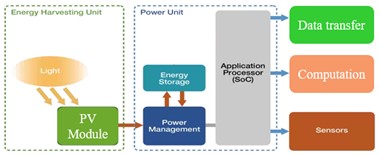MSc thesis project proposal
[2025] High-Efficiency Maximum Power Point Tracking and Power Management for Optical Wireless Power Transfer Systems
Optical Wireless Power Transfer (OWPT) has emerged as a promising solution for wirelessly powering implantable and wearable devices, overcoming the limitations of conventional battery-based systems. By leveraging optical links, OWPT can achieve higher energy transmission efficiency, long-range operation, and minimal electromagnetic interference. However, the effectiveness of OWPT is strongly dependent on the efficiency of Maximum Power Point Tracking (MPPT) algorithms and DC-DC power conversion, which play a critical role in optimizing the energy extraction and delivery process.
Despite significant advancements, conventional MPPT algorithms, such as Perturb & Observe (P&O) and Incremental Conductance (IC), suffer from slow convergence, steady-state oscillations, and inefficiencies under partial shading conditions. Furthermore, the integration of MPPT with highly efficient DC-DC converters tailored for OWPT systems requires further exploration. The goal of this research is to develop novel MPPT techniques and optimized power management circuits to maximize power transfer efficiency and ensure stable operation of OWPT systems under dynamic environmental conditions.
This MSc thesis project aims to address key challenges in OWPT by designing and implementing advanced MPPT algorithms, modeling DC-DC converters, and evaluating their performance under realistic conditions. The study will contribute to the development of next-generation optical energy harvesting systems, enabling their practical deployment in biomedical and IoT applications.
Assignment
The student will investigate advanced power management strategies and MPPT algorithms for OWPT systems. Based on the student’s interest, the research activities are structured as follows:
- Either, A) Study literature on state-of-the-art sensing circuits (ADCs) to make an optimum choice for the design spec. of our OWPT system. B) Design sensing circuits (ADC) in both schematic and layout levels using Cadence;
- Or A) Brief study Literature on state-of-the-art DC-DC converters, their performance criteria, etc. B) Modeling of DC-DC converters (time-variant analysis) and simulating their performance using MATLAB/Simulink. C) (Optimal goal) Develop a modeling approach for DC-DC converters based on Duty cycle signal and Load using Matlab-Simulink (Novelty). D) System-level implementation of the developed model with PV array, MPPT algorithm, and desired load to perform system-level evaluation.
The research will be tailored based on the student’s chosen specialization, either in mixed-signal modeling, or power management IC design.
Requirements
We are looking for an MSc student in Electrical Engineering, Track Microelectronics with a strong interest in power management, energy harvesting, and circuit design. This project is best suited for the candidate who is enthusiastic to learn and experience one or more of the following areas:
- MATLAB/Simulink, or equivalent for system modeling.
- Digital design tools (e.g., Verilog, VHDL, RTL synthesis) for MPPT algorithm implementation.
- Analog/mixed-signal circuit design and simulation (e.g., Verilog-A, Cadence).
- Power electronics, including DC-DC converters and energy harvesting techniques.
This project is highly interdisciplinary and ideal for students looking to develop their expertise in mixed-signal IC design, whether for a career in industry or for pursuing further research (PhD) in energy-efficient electronics, power management, or wireless energy transfer systems.
The project will be co-supervised by Kimia Ahmadi, MSc. and Prof. Wouter Serdijn.
Contact
Kimia Ahmadi
Bioelectronics Group
Department of Microelectronics
Last modified: 2025-02-12
